The Role of Cortisol in PTSD and How Supplements May Help
Introduction
When people think of PTSD, they often focus on flashbacks, nightmares, or emotional triggers. But behind these experiences lies a powerful biological player that most people overlook: cortisol, the body’s main stress hormone.
Cortisol doesn’t just make you feel stressed—it controls your body’s entire stress-response system, influencing how you think, sleep, and recover. In people with Post-Traumatic Stress Disorder (PTSD), this system becomes dysregulated, leading to chronic exhaustion, anxiety, and inflammation.
This article explores how cortisol and PTSD are deeply connected, and how nutritional supplements can support the body’s natural ability to restore balance.
Looking for supplements for This? Click here.
🌪️ What Is Cortisol?
Cortisol is a hormone produced by your adrenal glands, small organs that sit on top of your kidneys. It’s released in response to signals from the hypothalamic-pituitary-adrenal (HPA) axis, your body’s central stress communication system.
Under normal conditions, cortisol follows a daily rhythm:
It peaks in the morning to help you wake up and focus.
It gradually drops throughout the day, reaching its lowest levels at night to promote rest.
Cortisol plays vital roles in:
Regulating metabolism and blood sugar
Controlling inflammation
Supporting memory and focus
Managing sleep–wake cycles
But when stress becomes chronic, or when trauma rewires the nervous system, this rhythm breaks—and cortisol turns from a helper into a disruptor.
⚠️ The Cortisol-PTSD Connection: A Dysregulated Stress Response

PTSD is fundamentally a disorder of the stress response. After trauma, the brain’s alarm system (the amygdala, hippocampus, and prefrontal cortex) becomes hypersensitive.
When this happens, cortisol production and feedback control become dysregulated. Surprisingly, people with PTSD often have lower cortisol levels than expected—not higher.
Why? Because their stress system has been stuck in overdrive for so long that it burns out.
Key mechanisms include:
HPA Axis Dysfunction
After trauma, the brain releases excessive amounts of CRH (corticotropin-releasing hormone), which overstimulates the adrenals. Over time, this leads to blunted cortisol output—your body becomes “tired” of sounding the alarm.
Cortisol Receptor Hypersensitivity
Even if cortisol levels are low, the receptors in the brain become more sensitive. This means small amounts of cortisol can still trigger intense stress responses, anxiety, or emotional flashbacks.
Inflammation Feedback Loop
Low cortisol fails to suppress inflammation properly. Chronic inflammation, in turn, disrupts neurotransmitters like serotonin and dopamine, worsening mood and cognition.
Sleep Disruption and Cortisol Timing
People with PTSD often have flattened cortisol curves—their levels don’t fall at night, which makes it hard to sleep and recover.
The result? A constant feeling of alertness, fatigue, and emotional volatility—as though your body can’t tell the difference between real danger and a memory of one.
🧬 Symptoms of Cortisol Imbalance in PTSD
Cortisol dysregulation contributes to many symptoms of PTSD, both mental and physical:
Mental and Emotional Symptoms
Persistent anxiety or hypervigilance
Emotional numbness or irritability
Intrusive thoughts or nightmares
Difficulty concentrating or relaxing
Low resilience to stress
Physical Symptoms
Insomnia or frequent waking
Digestive issues (IBS, acid reflux)
Low energy and fatigue
Chronic pain or inflammation
Weight gain around the midsection
Lowered immune function
Because cortisol affects nearly every system in the body, PTSD symptoms often overlap with hormonal and metabolic issues.
💥 Cortisol, Memory, and the Brain
One of the most damaging effects of cortisol dysregulation is its impact on memory and emotional regulation.
Amygdala (Fear Center): Becomes overactive, causing exaggerated fear responses.
Hippocampus (Memory Integration): Shrinks in volume with chronic cortisol exposure, leading to fragmented memories and flashbacks.
Prefrontal Cortex (Rational Thinking): Becomes underactive, reducing the ability to calm down after stress.
This creates a neurological feedback loop: the more the person recalls trauma, the more cortisol spikes—and the harder it becomes for the brain to separate past danger from present safety.
🌿 How Supplements May Help Regulate Cortisol and Support PTSD Recovery
While therapy, breathwork, and trauma-informed practices are essential for recovery, nutritional support plays an equally important role in rebuilding the biological foundation of resilience.
Below are evidence-backed supplements that may help rebalance cortisol and support the body in PTSD management.
🧘 Adaptogens: Calming the Adrenal Response
Adaptogens are natural herbs that help your body adapt to stress, normalize cortisol levels, and strengthen the nervous system.
Ashwagandha (Withania somnifera)
Reduces serum cortisol by up to 30% in clinical studies.
Improves sleep, reduces anxiety, and enhances emotional stability.
Acts as both calming and energizing—ideal for people with fatigue and overthinking.
Rhodiola Rosea
Supports mental energy and focus.
Helps normalize low cortisol and reduce fatigue.
Especially useful for those with burnout or “flat” energy patterns.
Holy Basil (Tulsi)
Reduces cortisol spikes while improving mood.
Acts as an anti-inflammatory adaptogen that supports blood sugar stability.
Reishi Mushroom
Supports nervous system recovery and immune balance.
Known as the “mushroom of calm,” it helps regulate sleep and nighttime cortisol.
Best Practice:
Take adaptogens consistently for at least 6–8 weeks. They work gradually to restore equilibrium, not as quick fixes.
Looking for supplements for This? Click here.
💊 Magnesium: Calming the Nervous System
Magnesium is often called the “relaxation mineral.” Chronic stress rapidly depletes it, leaving the nervous system hyperactive.
Regulates the HPA axis and reduces excitatory brain activity.
Helps lower nighttime cortisol and improve deep sleep.
Supports GABA receptors (the brain’s natural calming system).
Recommended forms:
Magnesium glycinate – best for relaxation and anxiety.
Magnesium threonate – crosses the blood-brain barrier, supporting cognitive function and memory.
Dosage: 200–400 mg nightly.
🧠 Omega-3 Fatty Acids: Protecting the Brain from Inflammation
Cortisol imbalance and chronic inflammation go hand-in-hand in PTSD. Omega-3 fatty acids (EPA and DHA) help restore neurological and hormonal balance.
Reduces pro-inflammatory cytokines linked to stress and depression.
Improves neural plasticity, helping the brain “rewire” after trauma.
Enhances serotonin signaling and mood regulation.
Dosage: 1000–2000 mg EPA/DHA daily, ideally from fish oil or algae-based supplements.
🌸 B-Complex Vitamins: Energy and Adrenal Support

The B vitamins, especially B5 (pantothenic acid), B6, and B12, play crucial roles in adrenal function and neurotransmitter synthesis.
B5: Supports adrenal glands and cortisol regulation.
B6: Helps convert tryptophan to serotonin, stabilizing mood.
B12 and Folate: Support energy production and mental clarity.
Because stress depletes these vitamins quickly, supplementing daily can restore balance and prevent fatigue.
🌿 L-Theanine and Phosphatidylserine: Reducing Cortisol Spikes
L-Theanine, an amino acid found in green tea, promotes calm alertness by increasing alpha brain waves.
Lowers acute stress reactions without sedation.
Can be used alongside caffeine to smooth out anxiety.
Phosphatidylserine (PS) helps regulate cortisol by enhancing cell membrane communication in the brain.
Reduces cortisol spikes after psychological or physical stress.
Supports memory and focus.
Together, they create a balanced mental environment—calm but alert, peaceful but productive.
🌞 Vitamin D and Zinc: Immune and Hormonal Balance
Vitamin D3 supports the immune system and mood, helping regulate cortisol indirectly through inflammatory pathways.
Zinc is essential for neurotransmitter function and adrenal recovery.
Low levels of either are linked to higher stress sensitivity and depressive symptoms in PTSD patients.
💪 N-Acetyl-Cysteine (NAC) and Antioxidants
NAC boosts glutathione, the body’s master antioxidant, which neutralizes oxidative stress caused by chronic cortisol exposure.
Reduces inflammation and anxiety-related oxidative damage.
Improves emotional regulation and cognitive clarity.
Other antioxidants like Vitamin C, Alpha-lipoic acid, and CoQ10 can further protect the brain and mitochondria from cortisol-induced strain.
🌬️ Probiotics and Gut-Brain Connection
The gut microbiome strongly influences cortisol and stress resilience.
Gut bacteria produce neurotransmitters like GABA and serotonin.
Probiotics (Lactobacillus and Bifidobacterium strains) can lower cortisol and anxiety levels.
A healthy gut also improves nutrient absorption—especially magnesium and B vitamins critical for recovery.
A diet rich in fiber, fermented foods, and prebiotics can amplify the effects of these supplements.
🌙 Sleep Support: Restoring the Cortisol Curve
Restorative sleep is essential for regulating cortisol rhythms. Natural sleep-supporting supplements include:
Glycine – helps lower body temperature for better sleep.
Melatonin – helps re-synchronize disrupted circadian rhythms.
Chamomile and Lemon Balm – soothe the nervous system and promote parasympathetic activation.
Restful sleep helps reprogram the HPA axis and teaches your body that it’s safe again.
🔄 Combining Supplements with Trauma Therapy
Supplements alone can’t “cure” PTSD, but they make therapy more effective by stabilizing the biological systems therapy relies on.
Therapy (CBT, EMDR, Somatic Work): Reprograms fear responses.
Looking for online therapy ? Click Here.
Breathwork & Mindfulness: Restores parasympathetic tone, reducing cortisol.
Want to try Breathwork? Click Here.
Supplements: Rebuild the biochemical environment of calm and resilience.
Think of supplements as the soil that nourishes your healing—allowing therapy and emotional processing to take root more deeply.
⚖️ Practical Daily Stack Example for PTSD and Cortisol Balance
Morning:
Ashwagandha (300 mg)
B-Complex
Vitamin C (1000 mg)
Omega-3 (1000 mg EPA/DHA)
Rhodiola (200 mg, optional)
Afternoon:
Phosphatidylserine (200 mg)
L-Theanine (100 mg)
Electrolytes and hydration
Evening:
Magnesium Glycinate (300 mg)
Reishi Extract or Holy Basil (before bed)
Glycine (3 g) or Chamomile Tea
This rhythm supports energy during the day, emotional stability in the afternoon, and deep restorative sleep at night.
🌿 The Long-Term Vision: Healing from the Inside Out
Recovering from PTSD isn’t just about reducing symptoms—it’s about rebuilding a regulated stress system.
Balanced cortisol levels mean:
You wake up refreshed instead of panicked.
You can respond to stress instead of react to it.
You can feel safe in your own body again.
Supplements can’t erase trauma, but they can help you feel strong enough to face it. They give your brain and body the tools to heal, integrate, and reclaim calm from chaos.
Healing from PTSD is a journey, but every small biochemical shift—every night of better sleep, every calmer morning—moves you closer to peace. 🌿
Looking for online therapy ? Click Here.
🧾 References
Yehuda R, et al. “Alterations in cortisol dynamics in PTSD: a review.” Psychoneuroendocrinology. 2015.
Bremner JD. “Traumatic stress: effects on the brain.” Dialogues Clin Neurosci. 2006.
Panossian A, Wikman G. “Effects of adaptogens on the central nervous system and stress-protective activity.” Pharmaceuticals. 2010.
Blom EH et al. “Magnesium and stress regulation.” Nutrients. 2018.
Benton D, Donohoe R. “Omega-3 fatty acids and stress reactivity.” Nutr Res Rev. 2011.
Hellhammer DH, et al. “Phosphatidylserine and endocrine responses to stress.” Stress. 2004.
Lopresti AL, Drummond PD. “Ashwagandha for the treatment of stress and anxiety: A systematic review.” J Evid Based Complementary Altern Med. 2017.
van der Kolk, B. The Body Keeps the Score. Viking, 2014.
Raison CL, Miller AH. “Inflammation and stress-related disorders.” Am J Psychiatry. 2013.
National Center for PTSD. “Understanding PTSD and Recovery.” U.S. Department of Veterans Affairs, 2022.
Related Posts
-
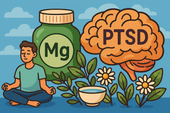
Magnesium and PTSD: Calming the Nervous System
Magnesium is one of the body’s most powerful natural stress relievers. 🌿 Learn how this essential mineral helps calm the nervous system, lower cortisol, ease anxiety, and support better sleep—making it a key ally for anyone recovering from trauma or PTSD.
-
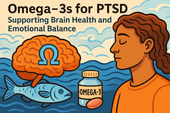
Omega-3s for PTSD: Supporting Brain Health and Emotional Balance
Omega-3s play a vital role in calming the brain and restoring balance after trauma. 🌊 Discover how these essential fatty acids support PTSD recovery by reducing inflammation, balancing neurotransmitters, improving sleep, and promoting emotional resilience—helping your brain heal from the inside out.
-
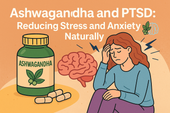
Ashwagandha and PTSD: Reducing Stress and Anxiety Naturally
Ashwagandha offers a natural path to stress and trauma recovery by calming the body’s stress response and restoring hormonal balance. 🌿 Learn how this powerful adaptogen can lower cortisol, ease anxiety, improve sleep, and support emotional resilience for those healing from PTSD.
-
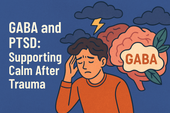
GABA and PTSD: Supporting Calm After Trauma
Therapy helps the brain rewire after trauma, restoring safety and self-trust. 🛋️ Discover how modern therapeutic approaches—like EMDR, CBT, and somatic therapy—help regulate the nervous system, calm intrusive memories, and rebuild emotional resilience for people recovering from PTSD and chronic stress.
-
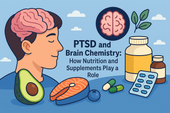
PTSD and Brain Chemistry: How Nutrition and Supplements Play a Role
PTSD isn’t just psychological—it’s deeply biological. 🧠 Learn how trauma reshapes brain chemistry and how nutrition, omega-3s, magnesium, B vitamins, and adaptogens can help rebalance neurotransmitters, reduce inflammation, and support emotional recovery from the inside out.
-
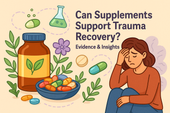
Can Supplements Support Trauma Recovery? Evidence & Insights
Can nutrients like Vitamin D and Zinc really support trauma recovery? 🌞 These two essential micronutrients play powerful roles in immune balance, inflammation control, and hormonal stability—all key systems disrupted by chronic stress and trauma. Learn how replenishing them can help restore strength and emotional resilience.
-
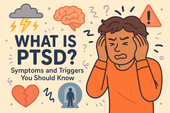
What Is PTSD? Symptoms and Triggers You Should Know
Post-Traumatic Stress Disorder (PTSD) can affect anyone who has experienced deep emotional or physical trauma. 🌪️ Learn how PTSD develops, what symptoms to look for, and the triggers that reignite distress—plus how understanding your body’s response to trauma is the first step toward healing and recovery.
-
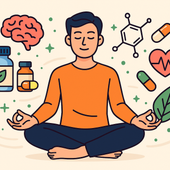
Creating a Daily Supplement Stack for Stress and Cortisol Management: A Science-Based Guide
Building a daily supplement stack for stress and cortisol management can help restore balance, focus, and calm in your life. 🌿 Learn how adaptogens, magnesium, omega-3s, and other key nutrients support your body’s natural stress response from morning to night—so you can feel grounded, energized, and resilient every day.
-
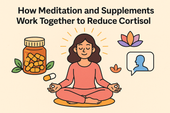
How Meditation and Supplements Work Together to Reduce Cortisol: A Complete Guide to Calming the Mind and Body
Meditation and supplements can work hand in hand to naturally reduce cortisol, your body’s main stress hormone. 🌿 Learn how mindfulness practices, adaptogenic herbs, and nutrient support like magnesium, omega-3s, and B vitamins create a powerful synergy for calm, focus, and emotional balance—backed by science and daily rituals that truly reset your stress response.
-
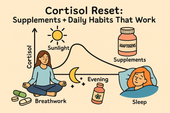
Cortisol Reset: Supplements + Daily Habits That Work
-
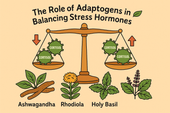
The Role of Adaptogens in Balancing Stress Hormones
Adaptogens work at the root of stress — your nervous system. 🌿 Learn how these powerful herbs help regulate cortisol, calm your nerves, and restore balance between energy and relaxation. ✨
-
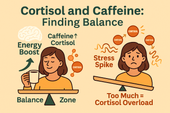
Cortisol and Caffeine: How Much Is Too Much?
Caffeine can boost energy and focus — but too much can overstimulate your stress hormones. ☕ Learn how caffeine affects cortisol, energy levels, and mood, and discover how to find the perfect balance for lasting calm and clarity. 🌿
-
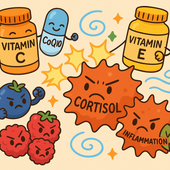
Antioxidants for Stress Management and Cortisol Control
When stress overwhelms your body, antioxidants come to the rescue. 🌿 Learn how vitamin C, CoQ10, and other natural compounds help reduce oxidative stress, regulate cortisol, and restore calm energy from within. ✨
-
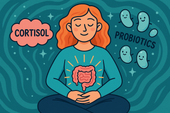
Cortisol and Gut Health: How Probiotics May Help
Chronic stress doesn’t just affect your mind — it changes your gut. 🌿 Learn how cortisol disrupts the microbiome and how probiotics can help restore balance, improve digestion, and calm your stress response naturally. ✨
-

Vitamin D and Cortisol: Supporting Immune Balance
Vitamin D does more than strengthen bones — it helps regulate cortisol and support immune balance. 🌞 Learn how this essential hormone-like nutrient restores calm, improves mood, and strengthens your body’s natural stress defenses. 🌿
-
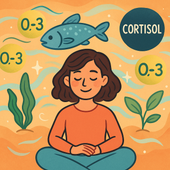
Omega-3s and Cortisol: Fighting Inflammation Naturally
Omega-3s are more than heart-healthy fats — they’re natural cortisol regulators. 🌿 Learn how EPA and DHA help reduce chronic inflammation, calm the nervous system, and support stress recovery from the inside out. ✨
-
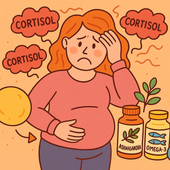
High Cortisol and Belly Fat: Can Supplements Help?
Chronic stress can make belly fat harder to lose — but supplements like ashwagandha, magnesium, and omega-3s may help restore cortisol balance. 🌿 Learn how science-backed nutrients support fat metabolism, calm your stress response, and bring your body back into harmony. ✨
-
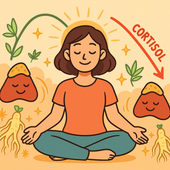
How Ginseng Can Support Energy and Cortisol Balance
Ginseng is one of nature’s most powerful adaptogens, helping your body handle stress without burning out. 🌿 Learn how this ancient root supports balanced cortisol, steady energy, and sharper focus — restoring vitality naturally and sustainably. ✨
-
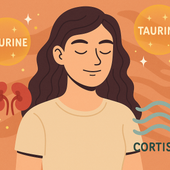
Taurine and Cortisol: Supporting Focus Under Stress
When cortisol surges, focus fades — but taurine helps restore balance. 🌿 Learn how this powerful amino acid calms your nervous system, regulates stress hormones, and sharpens concentration without jitters or fatigue. ✨
-
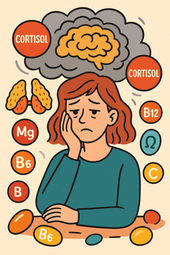
The Link Between Cortisol, Brain Fog, and Nutrient Deficiencies
When brain fog sets in, it’s not just in your head — it’s in your hormones. 🌿 Discover how cortisol imbalance and nutrient deficiencies like low magnesium, B vitamins, and omega-3s can cloud your focus and how restoring balance brings back mental clarity and calm. ✨
-
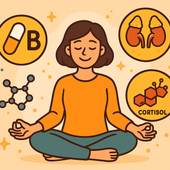
B Vitamins for Stress, Energy, and Cortisol Regulation
B vitamins are the foundation of stress resilience and steady energy. 🌿 Learn how this essential group of nutrients helps regulate cortisol, restore focus, and keep your nervous system calm — giving you balance from the inside out. ✨
-

Cortisol Imbalance and Chronic Fatigue: Can Supplements Help?
When chronic stress keeps cortisol high, fatigue and brain fog follow. 🌿 Learn how to rebalance your stress hormones naturally with calming nutrients, adaptogens, and lifestyle rituals that restore energy, focus, and inner peace. ✨
-

Adaptogen Stacks for Better Sleep and Lower Stress Hormones
Adaptogens can help your body recover from stress and sleep better by regulating key hormones like cortisol and adrenaline. 🌿 Learn how adaptogen stacks work to restore balance, calm the mind, and rebuild resilience — so you can rest deeply and wake renewed. ✨
-

Phosphatidylserine for Nighttime Cortisol Control
When stress hormones stay high at night, deep rest becomes impossible. 🌙 Discover how phosphatidylserine helps calm the brain, reduce nighttime cortisol, and restore healthy sleep rhythms — so you can wake up peaceful, clear, and recharged. ✨
-

Magnesium for Stress Relief and Cortisol Reduction
Magnesium is one of the most powerful natural tools for stress relief. 🌿 This essential mineral calms your nervous system, lowers cortisol, and helps your body recover from chronic tension. Learn how magnesium replenishes balance, improves sleep, and restores inner peace — naturally. ✨
-

Supplements to Improve Sleep by Balancing Cortisol
When cortisol stays high at night, sleep becomes a struggle. 🌙 Discover natural supplements that calm the nervous system, lower stress hormones, and restore your body’s natural rhythm. From magnesium and ashwagandha to L-theanine and phosphatidylserine, learn how to build deeper, more restorative rest. 🌿
-

Cortisol and Sleep: Why Stress Keeps You Awake
When stress keeps your body in fight-or-flight mode, cortisol refuses to calm down — and sleep becomes impossible. 🌙 Learn how elevated cortisol disrupts your circadian rhythm, suppresses melatonin, and turns restless nights into exhaustion. Discover how to restore balance and reclaim deep rest. ✨
-

L-Theanine for Cortisol Balance and Anxiety Relief
L-Theanine — the calming amino acid from green tea — helps quiet the mind and balance cortisol, the body’s key stress hormone. 🌿 Learn how it promotes calm focus, eases anxiety, and supports deep rest without sedation, backed by modern research and centuries of tradition. ✨
-

Rhodiola Rosea and Stress Resilience: A Natural Cortisol Regulator
Rhodiola rosea is one of nature’s most powerful tools for resilience. 🌿 This Arctic root helps balance cortisol, fight fatigue, and sharpen focus — keeping you calm yet energized even under stress. Discover the science behind Rhodiola’s adaptogenic power and how it helps your body thrive under pressure. ✨
-

Ashwagandha for Cortisol Balance: What the Science Says
Ashwagandha helps your body recover from chronic stress by calming the adrenal system and balancing cortisol — your key stress hormone. 🌿 Learn what science says about this powerful adaptogen, how it restores energy and focus, and why it’s one of nature’s most effective tools for modern stress relief. ✨
-

Supplements That Naturally Lower Cortisol Levels
When cortisol levels calm, your energy transforms — no more crashes or jitters, just steady focus and inner peace. 🌿 Learn which natural supplements and habits lower stress hormones, boost calm energy, and help your body thrive with balance instead of burnout. ✨
-

What Is Cortisol Imbalance? Symptoms You Shouldn’t Ignore
Cortisol — your body’s main stress hormone — keeps you alert and energized, but when it’s out of balance, it can drain your health. 🌿 Learn the signs of cortisol imbalance, from fatigue and anxiety to sleep disruption and stubborn weight gain, and discover how to restore calm, energy, and hormonal harmony naturally. ✨
-

The Best Daily Multivitamins for Menopausal Women
Menopause brings new nutritional needs that your old vitamin routine may no longer meet. 🌿 Discover how the right daily multivitamin can boost energy, balance mood, support bone and heart health, and keep your skin glowing. Learn which nutrients truly matter — from vitamin D to magnesium and B12 — to feel strong and vibrant every day. ✨
-

Antioxidants and Menopause: Fighting Inflammation Naturally
During menopause, oxidative stress and inflammation can quietly accelerate aging, fatigue, and skin changes. 🌿 Learn how antioxidants — from vitamins C and E to polyphenols in berries and green tea — help neutralize free radicals, reduce inflammation, and restore balance naturally. Discover the science of radiant, resilient aging. ✨
-

How CoQ10 Supports Heart Health After Menopause
After menopause, heart health becomes more important than ever. ❤️ Discover how CoQ10 — your body’s natural energy molecule — supports cardiovascular strength, restores vitality, and protects against oxidative stress. Learn how this essential nutrient helps keep your heart energized, balanced, and resilient through every stage of life. 🌿
-

Collagen Supplements for Skin and Joint Health Post-Menopause
After menopause, collagen loss affects both skin elasticity and joint comfort — but supplements can help rebuild from within. 🌸 Learn how collagen peptides, vitamin C, and other nutrients work together to restore firmness, reduce stiffness, and keep you glowing and mobile well into your next chapter. ✨
-

Calcium and Vitamin D: Protecting Bone Health in Menopause
Menopause brings hormonal changes that can weaken bones—but with the right nutrients, strength and stability can be rebuilt. 🦴 Learn how calcium and vitamin D work together to protect bone density, prevent fractures, and keep your body resilient. This guide explores nutrition, sunlight, and lifestyle habits that help your bones stay strong and vibrant for years to come. ☀️💪
-

Adaptogens for Energy and Resilience During Menopause
Feeling drained or emotionally scattered during menopause? 🌿 Discover how adaptogenic herbs like Ashwagandha, Rhodiola, and Ginseng can restore energy, balance cortisol, and build emotional resilience. Learn how these natural allies work with your body—not against it—to help you stay strong, focused, and calm through life’s hormonal changes. 🌸
-

Supplements That Help Beat Menopause Fatigue
Menopause fatigue can feel like more than tiredness—it’s a total energy crash. This guide explores how specific supplements, mindful breathwork, and therapy can help restore balance. Learn how nutrients like B vitamins, magnesium, and adaptogens rebuild your stamina, while breathwork and emotional healing calm your nervous system and bring vitality back to your days. 🌿✨
-

Herbal Blends for Menopausal Restlessness: Finding Calm in Transition
Herbal blends bring the wisdom of nature into moments of rest and renewal. Discover how soothing herbs like chamomile, lemon balm, and ashwagandha work together to calm menopausal restlessness, balance hormones, and invite deep relaxation. 🌿💫
-

Magnesium + Glycine for Deep Sleep During Menopause
Nutrients like magnesium, glycine, and B vitamins form the foundation for deep, restorative sleep during menopause. Discover how these natural compounds calm your nervous system, balance hormones, and help you wake up refreshed and recharged. 🌿💤
-

Melatonin and Menopause: Restoring Your Sleep Cycle
Nutrients are the foundation of hormone balance and energy. Learn how vitamins, minerals, and whole foods like greens, salmon, and berries nourish women’s bodies during menopause and beyond — restoring vitality, mood, and strength. 🌿🥗
-

How L-Theanine Helps With Menopausal Anxiety
Science continually deepens our understanding of the human body, from hormones to neurotransmitters. Discover how evidence-based research shapes modern wellness — bridging natural medicine, neuroscience, and hormone balance for healthier living. 🔬🌿
-

Can Ginkgo Biloba Improve Memory in Menopausal Women?
Hormone therapy can be a powerful tool for easing menopause symptoms and restoring balance. Learn how it works, the types available, and how to combine it safely with lifestyle and natural support for optimal well-being. 🌸💊
-

B Vitamins for Mental Clarity During Menopause
Nutrients are the foundation of mental and physical balance during menopause. Discover how vitamins, minerals, and whole foods like leafy greens, fish, nuts, and citrus can fuel energy, clarity, and calm while supporting hormonal health. 🌿✨
-

Mood Swings and Menopause: Natural Nutrient Support
Probiotics do more than support digestion — they help balance mood, hormones, and immunity too. Learn how a healthy gut microbiome can ease menopause symptoms, boost energy, and improve emotional resilience naturally. 🌿🦠
-

Brain Fog in Menopause: Supplements That May Help
Supplements can be powerful allies in restoring balance, energy, and focus—especially during menopause. Learn how nutrients like omega-3s, vitamin D, magnesium, and herbal adaptogens work together to support brain health, reduce stress, and promote lasting vitality. 🌿💊
-

Adaptogen Stacks for Reducing Night Sweats
Hormone detox isn’t about cleansing your body—it’s about restoring flow. Learn how the liver, gut, and endocrine systems work together to eliminate hormone buildup and how herbs like milk thistle, dandelion, and schisandra support balance, clarity, and natural vitality. 🌿💫
-

Cooling Menopause Symptoms with Herbal Support
Ashwagandha is one of nature’s most powerful adaptogens, helping women manage stress, sleep better, and balance hormones naturally. Discover how this ancient root supports calm energy, emotional resilience, and relief from menopause-related anxiety and fatigue. 🌿💫

















































